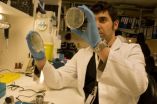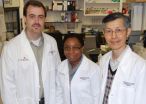(Press-News.org) A first year Environmental Science student at The University of Nottingham Malaysia Campus (UNMC) has had a literature review of the Southeast Asian monsoon published in the academic journal Geoscience Frontiers. Her research concluded that future climate warming could lead to a 15 day delay in the monsoon onset in Southeast Asia by the start of the next century.
Yen Yi Loo investigated how global and regional temperature and rainfall anomalies affect rainfall patterns and the South East Asian Monsoon. She also highlighted how increased rainfall intensity in the last decade has caused major floods in Malaysia, Thailand and the Philippines with implications for regional food security.
The review paper entitled; "Effect of climate change on seasonal monsoon in Asia and its impact on the variability of monsoon rainfall in Southeast Asia"; arose from work Yen Yi conducted for her first year module "Dissertation in Environmental Science" under the supervision of Dr Lawal Billa in the School of Geography and Dr Ajit Singh in the School
of Biosciences.
Explaining some of the challenges she encountered in writing this paper Yen Yi, who is now in the second year of her BSc in Environmental Science at UNMC, said: "I enjoyed doing the research very much, but at that stage our modules had yet to cover the relevant material, so it was a challenge to get up to speed with the new topic. Now that we are studying these topics in more depth in second year, it is good to see the research area in the context of the modules I am taking. Whilst writing the paper was hard work, I found the critical review process the most challenging. Nonetheless, the hard work really pays off in the end."
Inspiration for other students
When he became aware that the journal was compiling a special issue on Natural Hazards Yen Yi's dissertation supervisor Dr Lawal Billa suggested that Yen Yi submit her research for publication. Dr Billa said: "I hope Yen Yi's efforts and achievements will serve as a motivation to students in Environmental Science and other programmes at UNMC".
The Head of the School of Geography at UNMC, Dr Suzanne McGowan said: "This is a very significant achievement for a first year undergraduate student and we warmly congratulate Yen Yi".
Dr Festo Massawe, Head of the School of Biosciences at UNMC, added: "This is not only testament to the exceptional qualities of our students and academic staff but also confirmation that we offer a well-rounded educational experience to our students".
INFORMATION: END
First year student publishes monsoon study
2014-05-13
ELSE PRESS RELEASES FROM THIS DATE:
New agent may enhance effectiveness of radiotherapy
2014-05-13
Scientists from The University of Manchester – part of the Manchester Cancer Research Centre - have demonstrated the potential of a drug to improve the effectiveness of radiotherapy in stopping tumour growth.
There is increasing interest in using the body's own immune system to attack tumour cells – a strategy that can be very effective without the side effects associated with conventional chemotherapy.
Skin cancers have been successfully treated using a topical cream, imiquimod, which recruits immune cells through a molecule known as toll-like receptor 7 (TLR7), a ...
Arthroscopy of the knee joint for arthrosis: No benefit detectable
2014-05-13
The benefit of therapeutic arthroscopy with lavage and possible debridement for the treatment of arthrosis of the knee joint (gonarthrosis) is not proven. There was no hint, indication or proof of benefit of therapeutic arthroscopy in comparison with non-active comparator interventions, e.g. sham surgery, for any patient-relevant outcome. From the active comparator therapies, only the injection of glucocorticoids into the knee joint produced worse results than arthroscopy for the outcome "global assessment of the symptoms of gonarthrosis".
This was the result of the ...
Identified 2 new genes involved in the more aggressive prostate cancer
2014-05-13
A study by the Columbia University Nova York, in collaboration with the Catalan Institute of Oncology , Belvitge Biomedical Research Institute (ICO-IDIBELL) has identified two new genes that lead to more aggressive forms of prostate cancer. The work done by Alvaro Aytes under the direction of Cory Abate-Shen , director of the Herbert Irving Comprehensive Cancer Center of the Columbia University, has been published in the latest issue of Cancer Cell.
Prostate cancer
Prostate cancer is the most common in men in Europe( accounts for 20% of all male tumors). The incidence ...
A tale of survival
2014-05-13
Frankfurt am Main, Germany, May 12, 2014. Hydrogen sulphide (H2S) is a potent inhibitor of aerobic respiration. However populations of shortfin molly fish managed to colonise springs with high concentrations of dissolved hydrogen sulphide. In a new study researchers from LOEWE Biodiversity and Climate Research Centre (BiK-F) and the Goethe University Frankfurt present evidence of genetic changes minimizing the harmful effects of H2S which enable the fish to survive in this deleterious environment. The study provides insight into the molecular mechanisms of this key adaptation ...
Bird invaders 'moving in' to UK's nature reserves
2014-05-13
A new study by scientists at the University of York and the RSPB Centre for Conservation Science has demonstrated that nature reserves and other areas specially protected for wildlife, as well as being vital for native species, are very important for helping European birds to expand their ranges into Britain naturally. The catch is that protected areas are also at increasing risk of invasion by species that have been introduced from further afield.
The research, published in the journal Diversity and Distributions, explores how the UK's special places for nature have ...
Comet theory false; doesn't explain Ice Age cold snap, Clovis changes, animal extinction
2014-05-13
Controversy over what sparked the Younger Dryas, a brief return to near glacial conditions at the end of the Ice Age, includes a theory that it was caused by a comet hitting the Earth.
As proof, proponents point to sediments containing deposits they believe could result only from a cosmic impact.
Now a new study disproves that theory, said archaeologist David Meltzer, Southern Methodist University, Dallas. Meltzer is lead author on the study and an expert in the Clovis culture, the peoples who lived in North America at the end of the Ice Age.
Meltzer's research team ...
Chemists design molecules for controlling bacterial behavior
2014-05-13
Chemists in the College of Arts and Sciences have figured out how to control multiple bacterial behaviors—potentially good news for the treatment of infectious diseases and other bacteria-associated issues, without causing drug resistance.
Yan-Yeung Luk, associate professor of chemistry, has spearheaded the discovery, in conjunction with his research lab at Syracuse University and the Wang Lab at SUNY Upstate Medical University. Their findings are the subject of a forthcoming article in the journal ChemBioChem (John Wiley & Sons Inc.).
"Since the discovery of the first ...
UCSF: E-cigarettes expose people to more than harmless vapor, should be regulated
2014-05-13
In a major scientific review of research on e-cigarettes, UC San Francisco scientists found that industry claims about the devices are unsupported by the evidence to date, including claims that e-cigarettes help smokers quit.
The review marks the first comprehensive assessment of peer-reviewed published research into the relatively new phenomenon of electronic cigarettes.
The devices, which are rapidly gaining a foothold in popular culture particularly among youth, are marketed as a healthier alternative to tobacco smoking, as an effective tool to stop smoking, ...
Scientists from USC and NYU design a molecule that blocks cancer growth in mice
2014-05-13
A team of researchers from USC and NYU has developed and patented a small molecule that interferes with cancer progression with minimal side effects.
The molecule prevents two critical proteins from interacting by mimicking the surface topography of one protein – like wearing a mask – which tricks the other protein into binding with it. This stops a so-called "transcription factor" that controls the transcription of genetic information. That transcription factor is what would have created an aberrant gene expression, contributing to the cancer growth.
Because of the ...
Scientists slow brain tumor growth in mice
2014-05-13
Much like using dimmer switches to brighten or darken rooms, biochemists have identified a protein that can be used to slow down or speed up the growth of brain tumors in mice.
Brain and other nervous system cancers are expected to claim 14,320 lives in the United States this year.
The results of the preclinical study led by Eric J. Wagner, Ph.D., and Ann-Bin Shyu, Ph.D., of The University of Texas Health Science Center at Houston (UTHealth) and Wei Li, Ph.D., of Baylor College of Medicine appear in the Advance Online Publication of the journal Nature.
"Our work ...



